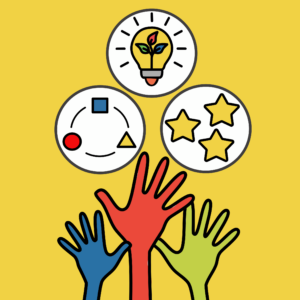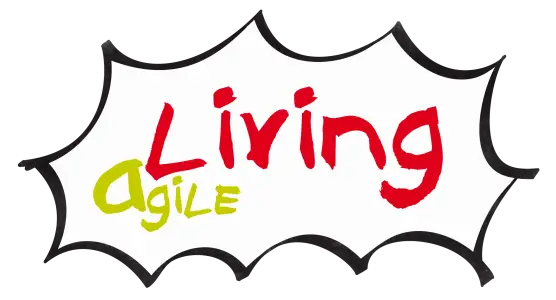What's a Movement?
A movement is a group of people who are committed to a common idea, vision or change. It is important that the followers do not just passively agree, but actively act and get involved to drive the idea forward. The initiator of a movement does not necessarily have to be the leader and often movements arise from the collective commitment of many people working towards the same goal.
What if we were to shape the desired and necessary changes in our organizations with people who are willing and able to achieve the goals together?
The will usually needs an inspiring “why” – we can promote the “can” and bring it into the company with movements.
New Learning
New Learning places individual development and initiative at the heart of learning. This approach emphasizes the importance of holistic learning, which not only aims to build skills but also focuses on personal development. It is a process that puts the learner at the center by encouraging self-direction and initiative, covering a wide range of skills from technical expertise to emotional intelligence.
Agile learning expands this perspective through a structured, iterative approach that supports self-organization and strengthens the practical application in everyday professional life through regular feedback and reflection cycles. This method facilitates continuous adaptation and improvement by encouraging learners to critically reflect on their progress and learn from their experiences.
For more information please look here.
Agile Learning
Agile learning expands this perspective through a structured, iterative approach that supports self-organization and strengthens the practical application in everyday professional life through regular feedback and reflection cycles. This method facilitates continuous adaptation and improvement by encouraging learners to critically reflect on their progress and learn from their experiences.
For more information please look here.
Social Learning
Social learning, on the other hand, emphasizes the importance of collaborative learning. By sharing knowledge and fostering collective skills within a group or community, this approach supports a deep and multi-layered learning experience. It demonstrates how collective intelligence and collaboration have the potential to enrich and extend individual learning.
For more information please look here.
Movement Learning
The learning approaches listed above reflect the many ways in which people learn throughout their lives – from family and peer groups to school and further education institutions. While traditionally the focus has often been on individual learning and personal self-organization, in today’s world of work, which increasingly demands teamwork and collaborative skills, shared learning goals are becoming more important. The challenge is to balance individual needs with the demands of the group, which requires openness and discipline. These skills can be overwhelming for many people and organizations.
The concept of movement learning brings an innovative solution to this challenge. It combines individual and collective learning processes through self-directed learning in small groups that work on learning content tailored to the respective level of knowledge of the participants. Participants tackle real-life tasks that are applied directly in an everyday context, supported by regular feedback from mentors and experts. Personal growth is also encouraged through 1:1 mentoring, with particular attention paid to individual needs and goals.
Movement learning emphasizes the importance of collective skill building and individual advancement by creating a balance between self-organized learning within a structured environment and leveraging group diversity to foster collaboration. This approach not only strengthens learning within organizations, but also ensures that valuable knowledge is not lost when individuals leave. It is a sustainable approach that sets the course for a future-oriented learning culture.
The cornerstones of the Movement: an approach to collective learning

Development of competencies
In an era characterized by exponential change, the acquisition of knowledge and skills is becoming increasingly important. Companies are increasingly addressing the need to upskill their workforce by offering internal training programs as well as supporting participation in external courses. These initiatives not only contribute to the personal development of employees, but also increase the attractiveness of the organization as an employer. Organizations recognize that investing in employee skills is a foundation for long-term success and innovation.
Collective learning as a cornerstone for effective collaboration
One aspect that is often underestimated in traditional educational approaches, which focus primarily on knowledge transfer, is the importance of collaboration as a basic prerequisite for innovation and the collective handling of change. This goes beyond the mere acquisition of knowledge. It requires group dynamics, social skills and diversity to achieve common goals. The structure of the Movement programs provides a framework that promotes collective learning and working and thus lays the foundation for effective collaboration.
Navigating complexity and uncertainty
In the face of rapid change, growing ecological and economic challenges and political and social unrest, there is increasing uncertainty at both a personal and organizational level. Skills to deal with this uncertainty are becoming increasingly important. Movement programs aim to enable participants to develop personal strategies for dealing with change. As a learning community, participants practise methods that promote resilience in the face of uncertainty and help them to act proactively rather than reactively.
Generating a snowball effect
A characteristic feature of Movement programmes is their ability to create a snowball effect within an organization. By turning former participants into mentors for subsequent programs, a culture of continuous improvement and knowledge transfer is created. These self-organized learning journeys reduce dependency on external training opportunities and promote sustainable development of organizational competencies.
Conclusion
In summary, movement programs offer an innovative and integrative approach to meeting the challenges of the modern working world. By promoting skills acquisition, collective learning, navigation through uncertainty and the snowball effect, they contribute significantly to the development of resilient and adaptable organizations.
The concept of movement learning is freely available under creative license.




